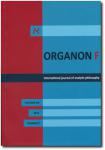Communication in a Multi-Cultural World
Communication in a Multi-Cultural World
Author(s): Marie DužíSubject(s): Logic, Communication studies, Culture and social structure
Published by: SAV - Slovenská akadémia vied - Filozofický ústav SAV
Keywords: Communication; concept; procedural isomorphism; structured meaning; Transparent Intensional Logic;
Summary/Abstract: The goal of this paper is to demonstrate that procedurally structured concepts are central to human communication in all cultures and throughout history. This thesis is supported by an analytical survey of three very different means of communication, namely Egyptian hieroglyphs, pictures, and Inca knot writing known as khipu. My thesis is that we learn, communicate and think by means of concepts; and regardless of the way in which the meaning of an expression is encoded, the meaning is a concept. Yet we do not define concepts within the classical set-theoretical framework. Instead, within the logical framework of Transparent Intensional Logic, we explicate concepts as logical procedures that can be assigned to expressions as their context-invariant meaning. In particular, complex meanings, which structurally match complex expressions, are complex procedures whose parts are sub-procedures. The moral suggested by the paper is this. Concepts are not flat sets; rather, they are algorithmically structured abstract procedures. Unlike sets, concepts have constituent sub-procedures that can be executed in order to arrive at the product of the procedure (if any). Not only particular parts matter, but also the way of combining these parts into one whole ‘instruction’ that can be followed, understood, executed, learnt, etc., matters.
Journal: Organon F
- Issue Year: 21/2014
- Issue No: 2
- Page Range: 198-218
- Page Count: 21
- Language: English

